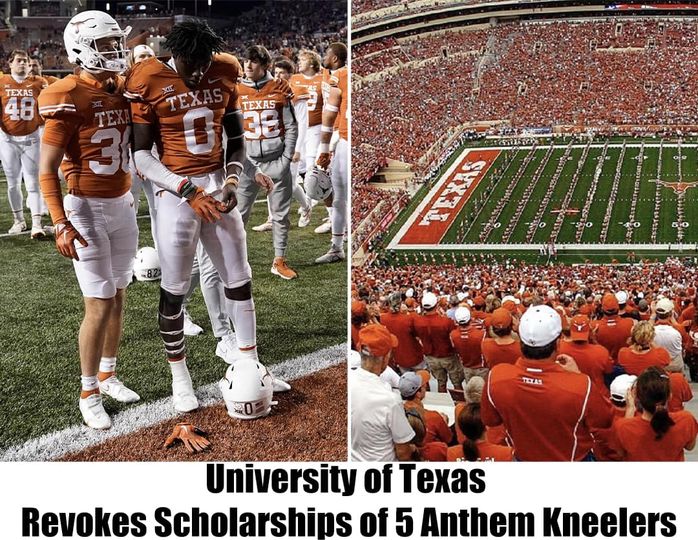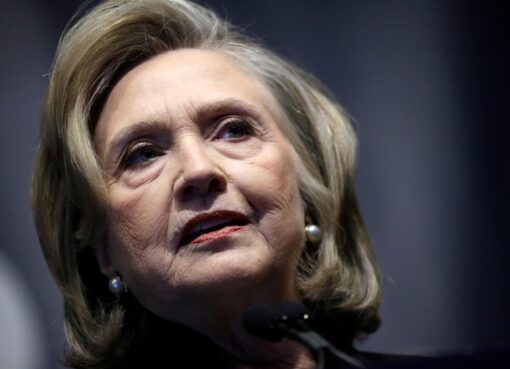University of Texas Revokes Scholarships of 5 Anthem Kneelers

University of Texas Revokes Scholarships of 5 Anthem Kneelers
In the echoing chambers of stadiums where athletic prowess usually takes center stage, a new, poignant drama unfolds, marring the traditional spectacle of college football. At the University of Texas, a decision to reportedly revoke scholarships from five student-athletes who knelt during the National Anthem has propelled the institution into the throbbing heart of a nationwide debate.
The act of kneeling during the National Anthem, initially spotlighted by former NFL quarterback Colin Kaepernick, has permeated various sports realms as a silent, non-violent protest against racial injustice and police brutality. As this act trickled down into the domain of college sports, it brought along a surge of socio-political waves, crashing into the sturdy walls of academic and athletic institutions.
Within the sprawling campus of the University of Texas, whispers turned into fervent discussions when news broke out regarding the alleged revocation of scholarships from five student-athletes—all of whom had chosen to kneel during the anthem, expressing solidarity with a broader, nationwide movement.
While the university has traditionally prided itself on cultivating an environment that nurtures the diverse perspectives of its student body, this recent incident seemingly cast a shadow over its reputation, prompting many to question: Where does one draw the line between institutional policies and the allowance for freedom of expression?
As the strains of the National Anthem filled the air, the five athletes took a knee, heads bowed in quiet contemplation, their silent protest voicing a potent message that transcended the confines of the sporting arena. Their actions, while resonating with many who advocate for racial equality and social justice, also ruffled the feathers of those who perceived it as an affront to national symbols and values.
The subsequent decision to revoke their scholarships plunged the university into a turbulent sea of scrutiny, critique, and a clamor for clarity on its stance regarding the intersection of athletic participation, scholarship provision, and political activism.
Historically, the realm of academia has been no stranger to acting as a fertile ground where seeds of activism, particularly among the youth, find room to germinate. Student-athletes, despite their dual role, straddling the demands of both sport and study, have often been at the forefront of such movements, utilizing their platforms to spotlight various issues.
In this delicate balance, where the scales tip between safeguarding tradition and facilitating progression, the University of Texas finds itself grappling with complex questions. Is the enforcement of policy, in this case regarding scholarships, inadvertently quashing the spirit of activism among its students? Or is it striving to preserve a semblance of neutrality amidst a highly polarized socio-political landscape?
While supporters of the athletes’ actions advocate for the imperative need to spotlight systemic issues and injustices, critics argue that the arena—where sportsmanship should ostensibly reign supreme—is not the place for political statements.
The stark contrast in perspectives points towards an underlying necessity: the establishment of a dialogue where diverse thoughts are not only voiced but also heard. In the echelons of the University of Texas, the student body, faculty, and administration now find themselves at a crossroads, where the paths to open conversation and rigid adherence to policies diverge.
The reported revocation of scholarships, while currently serving as a point of contention, also presents an opportunity. The University of Texas, under the watchful eyes of both the nation and its own constituents, now possesses the potential to set a precedent.
Will it pave the way towards establishing a platform where voices, irrespective of their pitch and timbre, find an equal footing? Or will it uphold a stringent adherence to policies, potentially risking the stifling of expression among its student body?
In the days to come, as discussions unfold and decisions are made, the university’s choice will inevitably find its place in the annals of history, either as a testament to fostering inclusive dialogue or as a reminder of the complexities entwining free expression and institutional norms.



Leave a Comment